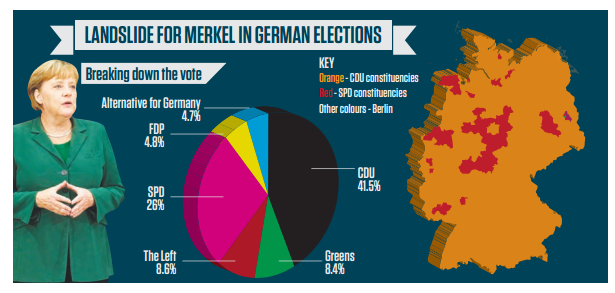Coalition talks start after clear Merkel triumph

CHANCELLOR Angela Merkel’s impressive victory in Sunday’s federal election was confirmed yesterday morning, with her party polling 41.5 per cent of the vote, the highest in nearly two decades.
Merkel’s Christian Democratic Union (CDU) has already contacted the Social Democratic Party (SPD) to initiate coalition talks. The CDU came just shy of an overall majority without the support of any other party, something that has not happened in Germany since 1957.
Combined, Merkel’s CDU and the Christian Social Union of Bavaria that the party is allied with, swept 78.5 per cent of the constituency-elected seats in the Bundestag.
Neither the small, centre-right liberals in the Free Democratic Party (FDP), nor the new eurosceptic Alternative for Germany managed five per cent of the popular vote, which is required to gain seats.

The result means that Merkel’s CDU is the only centre-right party represented, and must look to either the social democratic party or greens for a governing coalition.
The FDP had been a post-war fixture in the German parliament, but returned to representatives for the first time. Philipp Roesler, the FDP’s leader and vice chancellor in Merkel’s coalition, resigned yesterday.
There could be a lengthy wait for confirmation of Germany’s next government: a previous grand coalition with Germany’s social democrats (SPD) took over a month to negotiate.
Peter Schaffrik of RBC Capital Markets commented: “This should not change Germany’s European policies significantly. As we opined before, even in case of a grand coalition we do not expect a significantly different stance.”
Berenberg’s Holger Schmieding agreed that virtually no change to European policy was likely in the event of a grand coalition.
Schmieding added a number of potential policies that an SPD-CDU coalition government might embark on, with centre-left concessions like a small hike in the highest income tax rates, more sectoral minimum wages, and a minor fiscal stimulus.
Jonathan Pryor of Investec added: “The significance for the euro of Merkel being re-elected is that currency markets are generally quite precious when it comes to political change so a third term for Merkel is likely to be euro positive.”